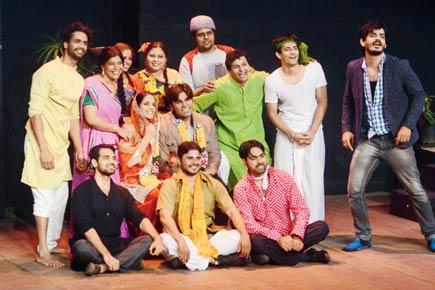Satirical plays have the power to deliver bitter truths about the times we live in, carefully wrapped in humour and irony

 Legend has it that when Neil Simon and his wife were getting a divorce, she was granted proceeds from his next play. So the hugely popular playwright wrote what he thought would be a flop play, called Fools. Very different from most of his work, Fools was a comedy about the inhabitants of a town who are cursed with stupidity. A man who comes from the outside and falls in love with a girl from the town, hopes to break the curse.
Legend has it that when Neil Simon and his wife were getting a divorce, she was granted proceeds from his next play. So the hugely popular playwright wrote what he thought would be a flop play, called Fools. Very different from most of his work, Fools was a comedy about the inhabitants of a town who are cursed with stupidity. A man who comes from the outside and falls in love with a girl from the town, hopes to break the curse.

Nadira Babbar has adapted Neil Simons’ Fools for her new play, Murkhapoor — a rambunctious farce
ADVERTISEMENT
The play that opened in 1981, was not an absolute washout, but like the work of all good writers, it seems to make more sense today, when we live in crazy times. This is what must have tempted Nadira Zaheer Babbar to adapt Fools for her new play Murkhapoor. There is potential for a delicious satire — Raghuveer, a teacher comes to Murkhapoor, and finds a strange atmosphere of cheerful idiocy. Like the tea seller whose sign says, “Aaj udhaar kal nakad,” instead of the other way round, his tea with salt in it and the samosa seller putting sugar in his wares, the fisherwomen selling flowers and insisting that a bouquet is a fish.
When he asks for directions to the Dwivedi residence, he is pointed in four different directions. When he reaches the house, he finds that he has been hired to teach Tara, the very pretty but moronic daughter of equally silly parents. He discovers that the town was cursed by the father of a boy, who killed himself because he was not allowed to marry the girl he loved, the reason being his illiteracy.
Now a descendant of that family wants to marry Tara, who keeps rejecting him. Raghuveer tries very hard to teach Tara, who is completely thickheaded. Either the curse ends or Raghuveer’s brain also curdles (dood phatna is used as a euphemism for losing the mind). Babbar who directs the play with son Arya has turned Murkhapoor into a rambunctious farce, with the cast comprising some of her regular actors and others from her workshops. The play is entertaining, but misses out on being the sharp satire that it could have been. Maybe it’s not the right time to poke fun at the powers that be, but history shows that so many tragedies took place because the majority chose to be willfully dense.
Satire is tough to pull off. To keep that balance between humour, irony, bitter truth, insight; deliver that knockout punch to the audience, and try not to offend any faction — it needs some doing.
A few weeks ago, Shardul Saraf wrote and directed a Marathi play, called Janak (as part of the Writers’ Bloc Festival) which was a fine piece of satire. A family consisting of parents, son and daughter-in-law — a regular middle class family — is living an ordinary life. Then, they get a hugely inflated electricity bill, running into lakhs. The father tries to have a conversation with the man who answers the company’s call centre phone, to no avail. When nothing works, he goes to court and loses the case. They lose their home and all their belongings to the power company called Janak. The court was owned by Janak, and the lawyers were Janak employees.
They go to a mall also owned by Janak, and get embroiled in a game show on a channel run by Janak. They end up living in a forest, only to be told it is owned by Janak. The water they drink is owned by Janak. The daughter-in-law, who is pregnant, is taken to a hospital run by Janak. Every aspect of their lives is controlled and monitored by Janak, in an Orwellian world where the individual is just a cog in a vast consumerist machine. The audience laughed at the family’s misfortunes, but there was a vague sense of unease too — everyone could guess who the barbs were aimed at.
At a time when a handful of wealthy corporates control the world’s resources, the ordinary citizen can either fight a losing battle or be co-opted into a system not of their own choosing. In the play, a device with eyes painted on descends sporadically, like George Orwell’s Big Brother from his classic 1984. We are heading into a no-privacy world, when personal information can be bought, sold and bartered. Dave Eggers’s 2013 novel The Circle was a biting satire on a social media company that seeks to gradually destroy the idea of an individual right to privacy, citing a larger social good of protecting the populace.
The ending of Janak can be said to be happy, but there’s a hidden warning — be afraid, be very afraid, or end up in Murkhapoor.
Deepa Gahlot is an award-winning film and theatre critic and an arts administrator. She tweets at @deepagahlot
 Subscribe today by clicking the link and stay updated with the latest news!" Click here!
Subscribe today by clicking the link and stay updated with the latest news!" Click here!







